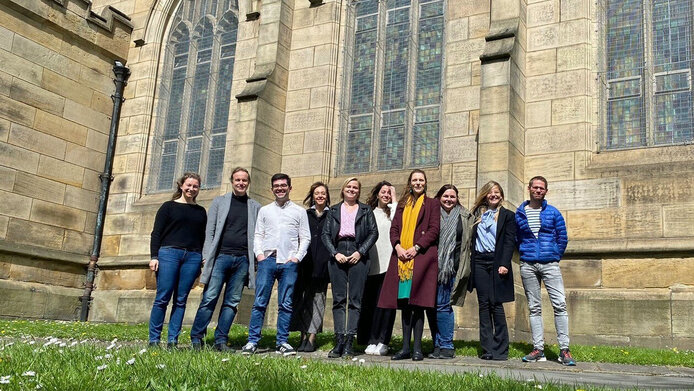“There is little acceptance for personalized political advertising”

Going where potential voters are is what parties strive to do in their election campaigns. As more and more voters spend time online, campaigns are seeking them out there. Austrians spend around five and a half hours a day on the Internet, one and a half hours of which is spent on social media. Plenty of time for campaigning parties to capture some of that attention for themselves.
Online campaigns offer parties the advantage of targeting users’ accounts with their core messages, which are specifically tailored to their profiles and preferences. The Cambridge Analytica data misuse scandal, Donald Trump’s 2016 election victory and the Brexit vote in the UK have all given rise to the question of whether data-driven election campaigns that use microtargeting pose a threat to democracy.
Over the past four years, international research teams have been investigating this question in one of the first comprehensive scientific studies of political microtargeting in the Netherlands, Germany, Austria and the UK. Communications scholar Sophie Lecheler was a member of the lead team and focused on Austria. In the following interview, Ms. Lecheler explains the DATADRIVEN project, co-funded by the Austrian Science Fund FWF, and the questions it addresses.
Sophie Lecheler is Professor of Communication Studies with a focus on Political Communication at the University of Vienna. The EU project "The Impact of Data-Driven Election Campaigns” (2020–2024) researched how microtargeting works in election campaigns.
Ms. Lecheler, how do social media platforms factor into election campaigns in Europe today?
Sophie Lecheler: Social media is of course very important everywhere, especially for certain segments of the population, but it is important to point out that these platforms are not the only channels for political campaigning. In Austria in particular, but also in other countries, established election campaign structures, such as campaign posters or televised discussions, still play a major role.
How else does Austria differ from other EU countries?
Lecheler: In other countries, such as the Netherlands, there are stricter regulations, such as where campaign posters can be put up. In Austria parties have more leeway in this respect. What makes social media so interesting for parties is the fact that these platforms are not yet clearly regulated, unlike other media outlets where clear laws apply. There is more margin of maneuver online, which also makes it so attractive for political advertising. Another advantage of the Internet is that you can reach a wide audience at relatively little cost.
What strategies do parties use to reach voters online?
Lecheler: Social media is well suited to reaching specific target groups, for example younger or older voters, people in rural or urban areas. On the one hand, you can motivate your own base to get out and vote, and on the other, you can also try to attract new voters.
As our analysis shows, it makes little sense to be active in spaces that aren’t a good match, for example, if you are a left-wing party trying to target a right-wing voter segment. In other words, you tend to look at which groups are interested in similar issues, or you try to reach people who are still undecided about whether to vote and for whom. The parties base their decisions on data like this.
In your international project, you focused on political microtargeting, in other words, personalized campaign ads. What specifically did you look at?
Lecheler: We are interested in learning how platforms like Meta or Google help parties gain more visibility. Only then can we understand how political advertising really works on the Internet. We are also looking at how people respond to campaign ads. Another important question is whether all sides are complying with the rules, and what benefits and drawbacks microtargeting has for society.
Social media feeds are a highly personalized environment, and it is simply no longer possible to know what people see prior to an election. The problem for us researchers is that the online platforms don’t share this kind of data. As a result, we don’t know, for example, which ads or how many of them voters in Austria see in the run-up to an election.
Do we need better legal regulations in Europe?
Lecheler: If we have no analytical insight into how platforms operate, we have only a very limited understanding of whether everyone is complying with the existing rules, such as the General Data Protection Regulation or the Digital Services Act, and what data is being passed on to the political parties. This in turn is a problem for the regulatory framework, which needs to be adapted continually to account for how the algorithms are developed and how they work. In the future, for example, we expect to see the use of artificial intelligence also becoming a major issue.
So how is your study being carried out?
Lecheler: We are approaching our study from different angles. For example, our research colleagues in the UK spoke to party representatives about their strategies and resources. In Germany and the Netherlands, large surveys asked voters what they had seen online. We are doing more and more surveys where we ask respondents to just give us their data - it’s called “data donation”. Here in Vienna, we conducted experiments (simulations) to see how people responded to political ads in an online environment. We have also developed a knowledge transfer game to raise awareness about advertising and explain to people what options and rights they have to block unwanted ads, for example.
How does microtargeting affect citizens?
Lecheler: We know from previous studies that targeted advertising for commercial purposes is not perceived particularly negatively, even if there are uncertainties about how it works. This is not the case with campaign ads. In many countries, there is very little acceptance for personalized political advertising; people find it rather creepy and lacking in credibility.
A study we conducted on the 2020 regional and municipal elections in Vienna showed that users who recognize advertising as such respond more skeptically if the message comes from a political party. At the same time, we also see that voters’ critical processing and the impact of microtargeting on them depends to a large extent on whether the party in the ad matches their own personal preferences.
How can you tell this is happening?
Lecheler: We know from studies on the effects of psychometric targeting, i.e. when the personality traits of the people targeted match the messages, that it boosts positive perceptions of candidates. For example, if introverts respond to an ad stoking fear and extroverts respond to an ad conveying enthusiasm, this mechanism can reinforce the message and increase voting intentions.
Identity-related messages, for example messages directly addressing women, can also increase voters’ propensity to vote for a candidate. On the other hand, presenting voters with inappropriate advertising can also backfire, as people are more likely to perceive this as manipulative.
Is digital advertising effective for boosting voter turnout in general?
Lecheler: We conducted a comparative study, among other things, in 25 countries with a total of 14,390 respondents who evaluated political advertising. One result was that general messages, such as urging people to go out and vote, are better received than urging them to vote for a specific party. In Austria in particular, consideration could be given to transferring voter mobilization and other key issues increasingly to digital formats. First-time voters, for example, can certainly be motivated this way. As we know, this is an important group, because if you vote once, you are likely to vote again.
Can digital marketing decide elections?
Lecheler: If a party actually manages to appeal to the right people, which is not that easy if you stay within the EU’s legal framework, it can also improve its showing in an election. The big question not only for me as a social scientist, but also for many citizens, is what influence these companies (platforms) have on our lives and on democracy. Political parties must also grapple with this question, because to a certain extent they give up some of their decision-making power when they accommodate the logic of the platforms. As a result, the political sphere itself is also changing. Whether this is good or bad is a long-term question.
What does it mean to exercise democracy under these conditions?
Lecheler: It will certainly have an impact on democratic behavior. But it’s not about abolishing these approaches. The focus must be on teaching people media literacy, for example to recognize disinformation. It is important to know how to fact-check information. And users have to be aware of how and where they are disclosing their data and how they can avoid doing so. And we need to think about what structures are needed to guarantee that information is provided honestly.
However, when it comes to campaign advertising, we are not talking about disinformation campaigns by fake accounts or trolls, which are a major issue in the international arena. These are already contexts, such as in US presidential elections, that have given rise to concerns.
The problem is really that we can say so little about it because we don’t know exactly what people are seeing. That’s why we need more collaboration among the various stakeholders, both across the EU and globally. From a research perspective, data transparency and access to data are essential. As a society, we need this empirical knowledge in order to be able to develop suitable regulations for the information society we live in. These efforts are only beginning to get underway.
About
Sophie Lecheler is Professor of Communication Studies with a focus on Political Communication at the University of Vienna. She holds a PhD from the University of Amsterdam and master’s degrees from the University of Munich and the University of Cambridge (UK). Her project "The Impact of Data-Driven Election Campaigns” (2020–2024) researched how microtargeting works in election campaigns. It was co-financed by the Austrian Science Fund FWF with EUR 253,000 as part of the European research network NORFACE.
EU regulations on political advertising
While microtargeting practices benefit from a less restrictive legal framework and are particularly successful in the United States, they face more stringent legal restrictions in the European context due to privacy and data collection regulations, including the EU’s General Data Protection Regulation. Further regulations to protect against influence peddling and to promote transparency have recently been set out in a new EU regulation, which stipulates that political advertising must be labeled as such.
Furthermore, information on who has paid for the ads and how much, and which elections or referendums the political ads are linked to must also be disclosed. Political targeting, i.e. ads tailored to a specific voter group, may only be carried out on the basis of personal data that is available with the user’s consent. Sensitive data such as sexual orientation, religion or political views may not be used so as to prevent manipulation.






